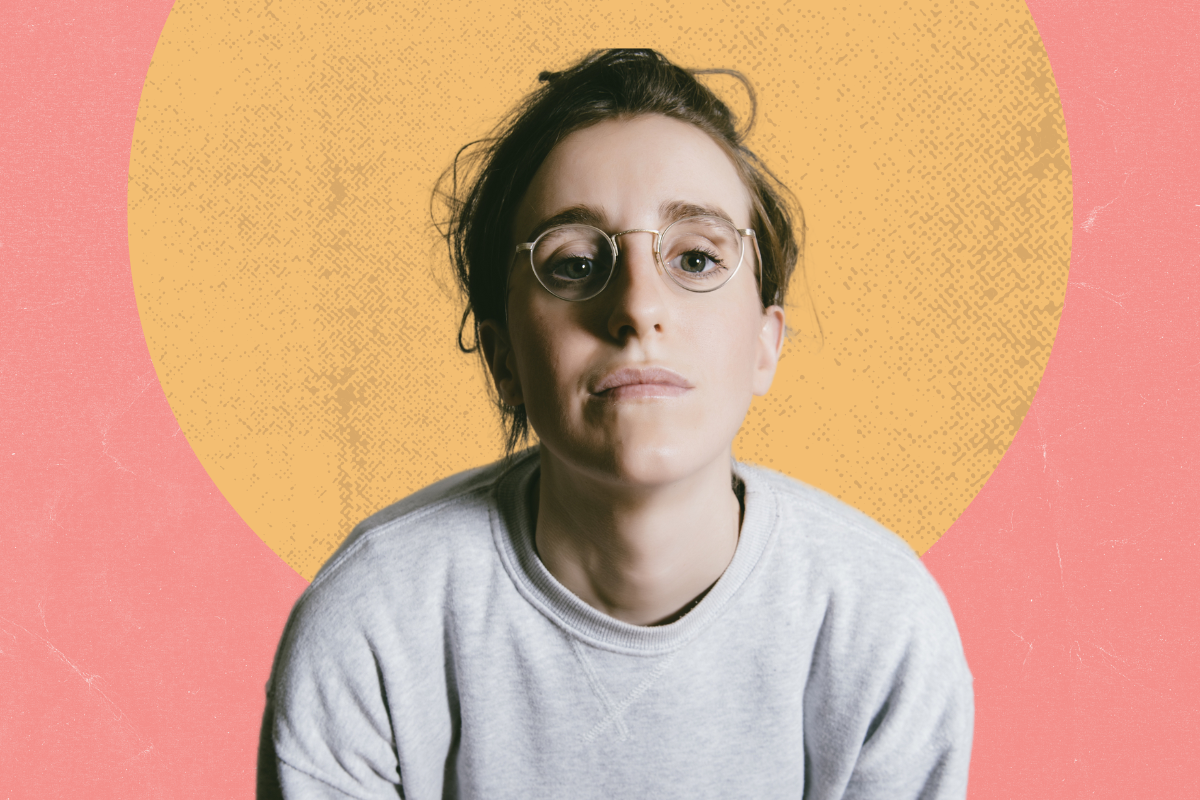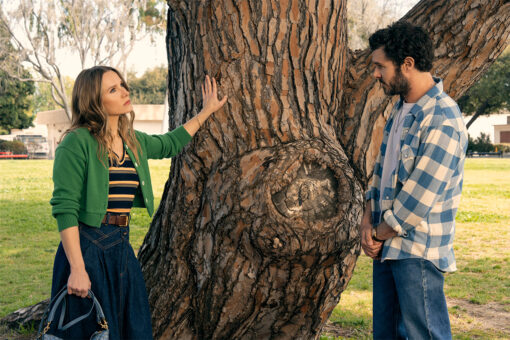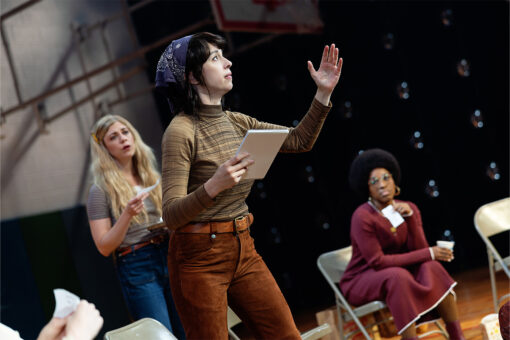In 2020, when COVID-19 put stand-up comedy on hold, comedian and writer Robby Hoffman temporarily transitioned from live performance to a call-in talk show called “Robby Hoffman’s Consulting Group.” It was a one-stop shop for advice in all areas of life: dating, fashion, finance, pets, etc. The show’s tagline, “I’m gonna be the first therapist to tell you exactly what to do,” reflects the characteristic confidence and self-awareness in Robby’s sense of humor.
Ex-Hasidic and queer, Robby has described herself as both “very Jewish” and “very gay.” “I naturally feel Jewish and naturally do Jewish people things. I don’t have to do something because I’m Jewish. I like doing the things I do because I’m Jewish,” she told me. Her comedy seems to use Judaism as a tool for self-exploration rather than a source for simple answers.
Across her talk show, her comedy special “I’m Nervous,” and this video where she talks to kids on their last day of summer break — “You’re in one of the worst mental states that I can recall. There’s nothing worse, is there?” she says, at one point, to a child — her work showcases a Jewish voice that is both familiar and unlike anyone else.
Robby is currently developing a TV show, “Rivkah,” with Showtime and A24. The project is inspired by her real life and focuses on two worlds: Robby’s current life as a genderqueer woman in LA and her childhood as a closeted girl in a Hasidic community.
I talked to Robby about how she shapes her identity and perspective with such conviction — and asked for some advice on how to do the same.
This interview has been lightly condensed and edited for clarity.
Did you ever go to a rabbi for advice as a kid?
I did not. I always thought everybody was wrong as a kid. Like, I guess I believe in God. I don’t know if God is a thing or if it’s forces, like love and energy and connectedness. But I never thought God was mad at me.
Once, when I was a kid, we were driving with my grandfather, who was not as religious as us, and he pulled over at McDonald’s for ice cream — because it’s like 99 cents a cone. And we were all like, “Zadie, it’s not kosher!” And he got down to my level, he’s like, “You think God with all the planets and the ecosystems gives a shit if a little Hoffman kid has an ice cream from McDonald’s?” And he just made sense.
Rabbis were there to lay it down, but they weren’t understanding of life for people. People are malleable and they tend to vary.
Did you go to anyone for advice?
Yeah, my sisters. I have nine siblings, I have four sisters and five brothers. My older two sisters, I learned a lot from. Everything from shoving a tampon — you know, way too early I learned that. My sister had me prepared for everything: dating advice, working advice.
My sister Chaya, in particular, moved out of the house young and was working and living a life and supporting herself. She really led by example and provided a good path for us. In my family, where resources were scarce, we didn’t have an example and a parental figure of how to make that life work. But my older siblings were the exact example I needed for my particular situation. I, too, would be moving out early. I, too, would have to get a job, keep a roof over my head and be independent. And I ended up having pretty good role models for doing exactly that.
These days, if I’m sitting with someone who I think is really a critical thinker in a certain area of life, then I’m interested to pick their brain or to ask them questions. I don’t think because somebody is a rabbi or somebody is a this, that they necessarily would have the right advice for my particular situation in my life. It all has to be tailored and make sense.
You’ve said you would be a great addition to “Queer Eye.” Thinking about the popularity of that show, why do you think people seek out advice from specifically queer mentors?
I think people generally turn to queer people because anybody who’s an outsider has a great perspective on the inside. If you’ve been othered in any way, you’re able to have a more objective point of view on the mainstream. If you haven’t faced adversity, it’s hard for you to see a lot of things. I think any adversity — somebody who’s been, you know, unfortunately very sick before, or somebody who deals with alternate sexual lifestyles or whatever — it gives you perspective. Not everybody gets the chance to look outside in.
What would you add to the show?
I think they gotta get a dyke onto Queer Eye, and I’m the one to do it. They need somebody who’s bringing back tough love. Classic tough love. That nightstand has gotta go. It’s nothing personal. It has got to go.
Financial advice: Let’s print a couple statements. Let me see what he’s spending on and why he doesn’t have money to take a girl out, OK? Because he’s spending on video games or God knows what. We’re gonna get to the bottom of things that aren’t happening on that show.
It’s not all gonna be hunky dory because we’re talking about real lives. Real lives aren’t hunky dory. I think a dyke would be the perfect addition to a show like that to give more of a complete overhaul of somebody’s life.
Netflix, if you’re listening, I’m happy to do it.
Speaking of tough love, there’s a hilarious video of you on Instagram talking to kids on their last day of summer break. In the video, it feels like you’re really leaning into fear. Do you think fear is a constructive emotion?
First of all, that video is a much shorter clip of the long conversation we had with them. That said, it’s not creating new fear. It’s recognizing their fear and empathizing. It’s like they’re afraid of the first day of school, and I’m afraid with them. So I just lean into wherever the kids are.
For me to say, “don’t be afraid” — what do I know about not being afraid when he’s afraid of things that he knows: the school he knows, the people he knows. I don’t know about it. So all I can do is be like, that does sound scary, and not everything has to be dandy.
Many grown-ups have the impetus to say, “You’ll be fine.” We don’t know if he’ll be fine. I’m just saying it’s OK to be afraid and you will get through it. Not to overuse a buzzword, but it’s validating.
Do you think sharing suffering with others is a Jewish thing?
I don’t think we should be relating our suffering to other people’s suffering. I think all suffering can be unique and is connected, you know? I think what you’re saying, maybe, is do we have more of an empathetic button? I think people who have gone through a lot may have more of an empathetic button. If you can remember how pain feels, it helps you empathize more with it.
In Judaism, when somebody dies, I think the thing that we say is, “I can only imagine what you’re going through.” We don’t purport to know exactly what you’re going through. I can only imagine, and from what I’m imagining, based on what you’re telling me, it sucks, and I’m sorry I don’t have a solution, but I’m here and I’m trying to understand.
Life is gonna suck. We have sucky experiences and we have great experiences. Great experiences help something be bad and a bad experience helps something else be great.
I noticed one of your catchphrases is that things “make you sick.” Why such a strong reaction?
I’m bothered by all small things, but I’m actually great in an emergency. For me, to complain is to enjoy. I could be on a yacht, it could have the nicest floors, and I’ll still say it’s a little sunny for me here. That’s just me enjoying finding the problem. I get to the smallest, smallest levels of it, you know? So, complaining is how I enjoy things. It means if I haven’t mentioned it, I love it. Everything else I haven’t mentioned means I’m fucking thrilled, and that’s way more than the complaints.
Do you think people who grew up secular lack some insight about religious communities you have as someone who grew as part of one?
I think it’s possible, but they have other insights. I do think a lot of their Jewish portrayals teeter on — not antisemitic because they’re Jewish, but I think because their portrayals of Jewish life come from either non-Jews or secular Jews imagining religious Jewish life, there’s a touch of stereotyping. I don’t always disagree with stereotyping. A lot of them are generalizations, that’s fine. But it doesn’t feel authentic. There’s something like, oh, they don’t get it.
As somebody who grew up that way, seeing a mischaracterization of people you grew up with can be slightly offensive when it’s not coming from an insider.
Like the trope of the overbearing Jewish mom?
Yeah, for instance, I don’t have a coddling mom. My mom was very meat and potatoes. She was very bare bones, no frills — we’re gonna be fed, we’re gonna be sheltered, we’re gonna be educated. Period.
I think a lot of people assume when you’re poor you have no food, but we had tons of food. My mother’s priority was food. So, we had not a lot of room, we were cramped in rooms together, but we ate. She cooked every day. Laundry. We were educated well, we had books and books and books in the house. And we were home where she could see us. And that was it.
I’m not mean to my mother. A lot of secular people have more of a friendship role with their mother and they can get snappy. I was not that way with my mother, and I think most old people with old-school parents are not that way. We would never. It doesn’t bring anything to me to yell at my mother. The stereotypical tropey mom — this nagging mother and a son that’s always yelling at her — it’s just not my experience at all. We just love and respect what she did.
Stereotypes can be dangerous because there are people on the outside and people on the inside. Do I mind when I see representation of a Jewish mother who’s not like mine? No. That’s many other people’s experience. I think people know it’s generalization, and there’s room for variance, and some people didn’t grow up like that. I just try and bring my own authentic – I’ll try and create the mother I saw, and maybe that helps other people relate or it’s fun for them, right?
When you give advice, do you find yourself remembering a lesson from religion? Or is it always just from Robby?
I remember lessons from everything. Yes, I have tons of great notes from religion — even wearing the yarmulke to remind you not to get too big, there’s always something higher than you. There’s small things like that and there’s big things.
Many religious aspects I get from my mother. She was such a naturally religious person without fitting into the books of it. For instance, when we were really tight, which was my mother’s way of saying financially we didn’t have any room this month — nothing’s happening. Okay, you’re coming home, you’re eating, that’s it. You’re going to bed, taking a bath. But I remember we were walking downtown once, and somebody was begging for money, and my mother gave a five. I’m like, “You’re giving a five?! Like, I thought we were tight. You’re giving five?” She goes, “Sometimes it’s important to give, to remind yourself you’re in a position to give.” And that’s at the lowest. Sometimes if you’re feeling the tightest, it’s a good reminder if you have anything to give, to give. It’s something I remember when I’m feeling low: The next homeless person I see, I have to give them the smallest denomination of money I have. Sometimes, it’s a 20 and I’m like, “Ah!” And it’s just, “Good luck to you.”
It’s a religious concept that maybe isn’t exactly religious, but feels it to me.
I’m curious, do you have a favorite kind of advice to give?
No, I love giving all advice. I talk out of my ass most times. There’s a lot I don’t know and I talk about it like I do know, and I enjoy that so much. I don’t think we should leave that just to the Joe Rogans of the world. I’m able to talk out of my ass too and enjoy it just as much.
If you weren’t a comedian, would you actually want to be a rabbi of a mega synagogue?
Yes. I like performing to big audiences. I grew up with big crowds. A lot of Jews together is, to me, funner than five Jews together. The more we can get, the better. It would feel really powerful to have that many Jews. It’s kind of like when you go to Israel — the best thing for me was that everybody was Jewish. Where we grew up, most people were not Jewish. Now I live in Los Angeles and New York, so I experience more of that. But the guy working at McDonald’s in Israel is Jewish. The bus driver is Jewish. Everybody being Jewish is just a cool feeling for a second. And I think mega shul would accomplish that.
I wanted to end by asking you for some advice. I have a queer family and we’re Jewish, but when I go to temple, I feel like all the stories are heteronormative and the gender roles just don’t look like our family. Do you have any advice for making more queer space in Jewish spaces?
See, I live by double standards and contradictions. I have no problem being like, well, that’s a double standard I have. Or yeah, that’s a contradiction I have. You know, it just creates a flavor.
I will say: I don’t think you have to do anything. By me being [at synagogue], it’s, I guess, queerer. But I just lean into whatever it’s doing. You go to a reform synagogue and the women are in yarmulkes whatever, and everything’s doing. It’s like, that’s kind of just not the religion. It’s fine, it is the religion — do whatever you wanna do. But I don’t care to make something for me. I enjoy looking in. I enjoy the old traditions. It’s a reason why I like some of the traditional Jewish things. It’s an unchanged thing, for the most part.
If it’s heteronormative, you know what I do? I go to the boys’ side. I lean into the heteronormative aspect of it. If I’m able to pick a side, I pick a side I like. For people who are in the middle, they could just sit there.
I kind of sit back and enjoy whatever the hell’s happening. I don’t really have an intention of, how do we make this more queer? As long as I get to be me, I don’t really care to change anything else. If they wanna change, great. But, you know, my own life I get to tailor specifically for me, and I enjoy that. That’s enough tailoring.



